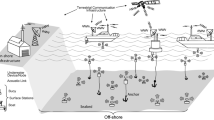Abstract
Due to the long propagation delay of acoustic waves and limited available bandwidth of the underwater acoustic channels, it takes a long delay for the handshaking between the transmitting/receiving nodes to avoid the data/control packets collision. This will decrease the channel utilization ratio, and increase the power consumption of the nodes. In this paper, a reversal multichannel media access control protocol using blind source separation for underwater acoustic sensor networks is presented. Compared with existing multichannel protocols, the proposed MAC protocol adds channel reservation information in handshaking packet, and uses the blind source separation to deal with the control packets collision. It makes the channel reservation will be finished before the current data transmission ending. At the end of this paper, the simulation results show that the network throughput and energy consumption of the proposed MAC protocol are much better than that of multichannel MACA on the heavy network traffic condition.
Access this chapter
Tax calculation will be finalised at checkout
Purchases are for personal use only
Preview
Unable to display preview. Download preview PDF.
Similar content being viewed by others
References
Tzamaloukas, A., Garcia-Luna-Aceves, J.: A receiver-initiated collision-avoidance protocol for multi-channel networks. In: Proceedings ot the IEEE Twentieth Annual Joint Conference of the IEEE Computer and Communications Societies, INFOCOM 2001. IEEE (2001)
So, J., Vaidya, N.H.: Multi-channel mac for ad hoc networks: handling multi-channel hidden terminals using a single transceiver. In: Proceedings of the 5th ACM international symposium on Mobile ad hoc networking and computing. ACM (2004)
Han, Y.S., Deng, J., Haas, Z.J.: Analyzing Multi-Channel Medium Access Control Schemes with Aloha Reservation. IEEE Transactions on Wireless Communications 5(8), 2143–2152 (2006)
Mo, J., So, H.-S., Walrand, J.: Comparison of Multichannel Mac Protocols. IEEE Transactions on Mobile Computing 7(1), 50–65 (2008)
Zhou, Z., Peng, Z., Cui, J.-H., Jiang, Z.: Handling Triple Hidden Terminal Problems for Multichannel Mac in Long-Delay Underwater Sensor Networks. IEEE Transactions on Mobile Computing 11(1), 139–154 (2012)
Pompili, D., Melodia, T., Akyildiz, I.F.: A Cdma-Based Medium Access Control for Underwater Acoustic Sensor Networks. IEEE Transactions on Wireless Communications 8(4), 1899–1909 (2009)
Zhou, Z., Peng, Z., Xie, P., Cui, J.-H., Jiang, Z.: Exploring Random Access and Handshaking Techniques in Underwater Wireless Acoustic Networks. EURASIP Journal on Wireless Communications and Networking 2013(1), 1–15 (2013)
Bengio, Y., Courville, A., Vincent, P.: Representation learning: A review and new perspectives. IEEE Transactions on Pattern Analysis and Machine Intelligence 35(8), 1798–1828 (2013)
Bengio, Y., Lamblin, P., Popovici, D., Larochelle, H.: Greedy layerwise training of deep networks. Advances In Neural Information Processing Systems 19, 153 (2007)
Stojanovic, M.: On the Relationship between Capacity and Distance in an Underwater Acoustic Communication Channel. ACM SIGMOBILE Mobile Computing and Communications Review 11(4), 34–43 (2007)
Author information
Authors and Affiliations
Corresponding author
Editor information
Editors and Affiliations
Rights and permissions
Copyright information
© 2015 Springer International Publishing Switzerland
About this paper
Cite this paper
Yu, Y., Shi, J., He, K., Han, P. (2015). A Reservation Multichannel MAC Protocol Utilize Blind Source Separation. In: Liu, H., Kubota, N., Zhu, X., Dillmann, R. (eds) Intelligent Robotics and Applications. Lecture Notes in Computer Science(), vol 9246. Springer, Cham. https://doi.org/10.1007/978-3-319-22873-0_10
Download citation
DOI: https://doi.org/10.1007/978-3-319-22873-0_10
Publisher Name: Springer, Cham
Print ISBN: 978-3-319-22872-3
Online ISBN: 978-3-319-22873-0
eBook Packages: Computer ScienceComputer Science (R0)




